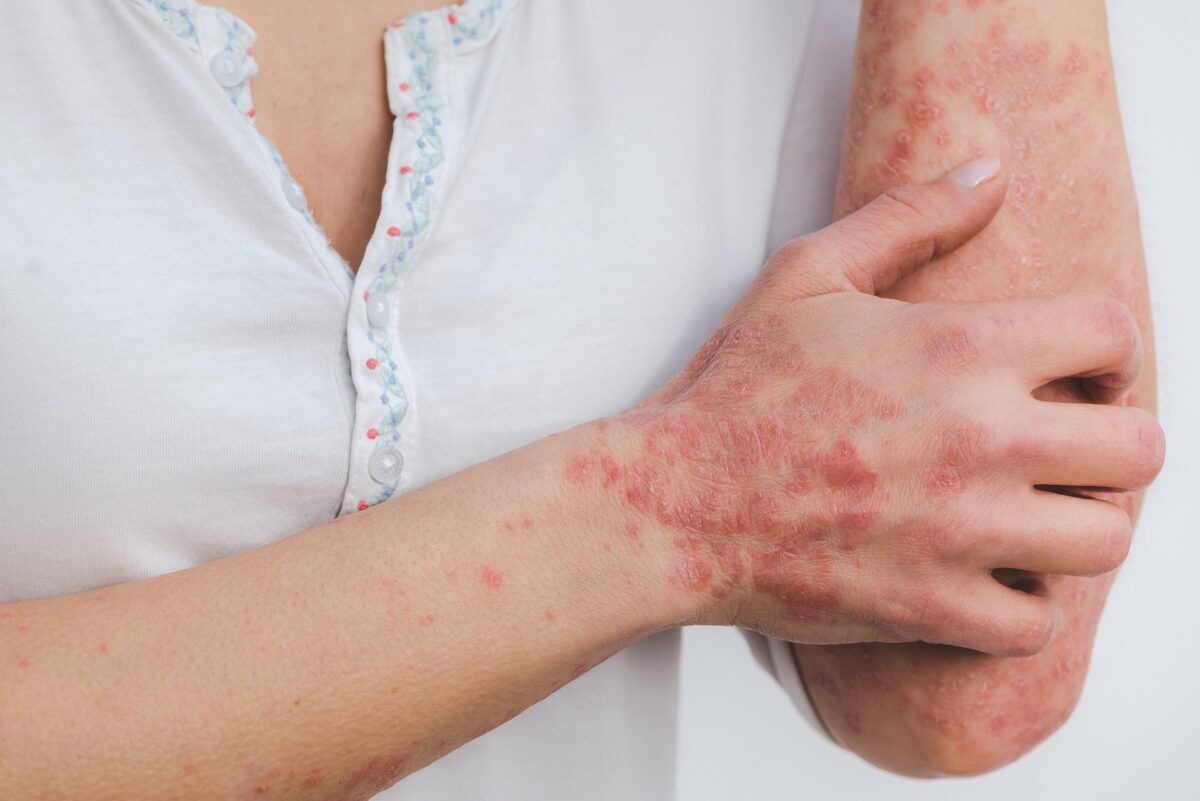“…With Anti-Inflammatory Foods (and Other Lifestyle Tweaks)”
I see you. I see you battling your Chronic Disease or Illness, and struggling each and every day with the debilitating symptoms. Before this war was waged on your system, though, you may remember otherwise having a simple cut, sprain, or a sore throat. The area felt painful and hot, and looked red and swollen. Those were telltale signs of inflammation. And Inflammation is a natural and essential process that your body uses to defend itself from infections and heal injured cells and tissues.
Inflammation is sometimes compared to a fire. It produces specific biochemicals that can destroy invaders like bacteria and viruses, increase blood flow to areas that need it, and clean up debris. It can be a good thing. But, sometimes it’s possible to have too much of a good thing.
Before we talk about the power that certain dietary and lifestyle habits can have on inflammation, let’s sort out the two different types of inflammation.
Types of inflammation (acute vs. chronic)
There are two kinds of inflammation: acute and chronic. Acute inflammation is short-lived. It’s like a flaming fire that produces the painful, red, hot, swollen symptoms described above. When inflammation is acute it’s usually at high levels in a small localized area in response to an infection or some kind of damage to the body. It’s necessary for proper healing and injury repair.
When your cells detect an infection or damage they send out warning signals to call over your immune system to help out. Your immune system sends over many types of white blood cells to help fight off invading germs, bacteria, viruses, and/or pathogens, and clean up damage so you can heal.
Symptoms of acute inflammation may need short-term treatment such as pain relievers or cold compresses. More serious symptoms like fever, severe pain, or shortness of breath may need medical attention. In general, acute inflammation goes away after the damage is healed, often within days or even hours. Acute inflammation is the “good” kind of inflammation because it does an essential job and then quiets itself down.
Chronic inflammation is different (as you may already well know or are experiencing). It’s more of the slow-burning and smouldering type of fire. This type of inflammation can exist throughout your whole body at lower levels. This means that the symptoms aren’t localized to one particular area that needs it. Instead, they can appear gradually (or seemingly, for some, not easily appear at all), and can last much longer—months or even years. This is the “bad” kind of inflammation.
Chronic inflammation is often invisible without immediate or serious symptoms, but over the long-term it’s been linked to many of the most simplistic to otherwise most dramatic of chronic diseases such as:
- Acne, eczema, and psoriasis
- Allergies and asthma
- Autoimmune diseases (arthritis, type 1 diabetes, multiple sclerosis, lupus)
- Cancer
- Chronic pain
- Gastrointestinal disorders (Crohn’s disease, ulcerative colitis)
- Heart disease and stroke
- Lung diseases (emphysema)
- Mental illnesses (anxiety, depression)
- Metabolic diseases (type 2 diabetes)
- Neurodegenerative diseases (Alzheimer’s, Parkinson’s)
How does chronic inflammation begin? It may start acutely—from an infection or injury—and then instead of shutting off, it becomes persistent. Chronic low-grade inflammation can also occur with exposure to toxins or chemicals (e.g., tobacco) or radiation, consuming an unhealthy diet or too much alcohol, not being very physically active, feeling stressed or socially isolated, and having excess weight.
Now that we see that inflammation underlies so many of our medical conditions, here’s what to do to put out those slow-burning, smouldering fires.
Nutrition and lifestyle tips for reducing chronic inflammation and symptoms of many chronic diseases or related illness
Studies show that reducing inflammation can not only reduce the symptoms of several of these conditions (including heart disease and cancer), but may equally reduce the likelihood of developing them. Most recognizably, there are medications used to help lower inflammation to treat some of these diseases such as corticosteroids, immunosuppressants, and biologics. However, there are also several lifestyle changes—including a healthy, nutritious diet that speaks specifically to your own genetics and metabolism—that can be very helpful in preventing and/or scaling down inflammation, and reducing its many damaging effects on the body.
“For chronic low-grade inflammation not caused by a defined illness, lifestyle changes are the mainstay of both prevention and treatment,” says Harvard Health. The good news is that anti-inflammatory foods help you stay healthy and reduce your risk of many diseases. In fact, it’s estimated that 60 percent of chronic diseases could be prevented with a healthy diet. Here’s how.
Enjoy highly-nutritious, anti-inflammatory foods (being aware of your specific needs – and which foods may not be right for you ‘right now’, based on your current diagnosis or challenge):
- Increase your intake of fruits and vegetables, whole grains (brown rice, oats, bran), nuts (almonds), seeds, fish, poultry, legumes (beans, lentils), and healthy oils (olive oil)
- Pay particular attention to foods high in antioxidant polyphenols, including colorful plants such as berries, cherries, plums, red grapes, avocados, onions, carrots, beets, turmeric, green tea, and dark green leafy vegetables like spinach and kale
- Omega-3 fats can help to reduce pain and clear up inflammation and are found in salmon, trout, mackerel, soy, walnuts, and flax
- High fiber foods (whole grains, vegetables, fruits, legumes) encourage friendly gut microbes to help reduce inflammation
- Avoid charring foods when cooking at high temperatures
- Limit inflammatory foods such as red and processed meats (lunch meats, hot dogs, hamburgers), fried foods (fries), unhealthy fats (shortening, lard), sugary foods and drinks (sodas, candy, sports drinks), refined carbohydrates (white bread, cookies, pie), and ultra-processed foods (microwaveable dinners, dehydrated soups)
Be physically active:
- Regular exercise reduces inflammation over the long-term, so try to get at least 150 minutes of moderate-intensity aerobic exercise (brisk walking – preferably outdoors when safe and/or possible to do so – especially if your ‘outdoors’ involves access to nature) per week; about 20-30 minutes per day
- To this add two-to-three (or more) strength training sessions (using weights or resistance bands) each week
I don’t necessarily ‘favour’ one of these sections or Lifestyle Medicine directives over any other, but exercise and/or movement is huge. And I’m taking a moment outside of the list to mention it, because I often see people who are struggling with mobility and this one is a ‘wall’ for many of them. So here’s my take; ‘do what you can, but do something’. And I often say this with all of the work I do with those who seek my guidance and expertise, but the ‘do something’ part can mean something as lite as bicep curls with bands, or overhead presses, or leg extensions, etc. (if you have certain parts of your body that you find it more difficult to do work with). Or, if you have limited energy stores in the midst of your diagnosis, maybe do the few sets you’re able of ‘goblet squats with press’ with bands (or body-weight, etc.) as a ‘full-body’ type of movement. Again, it’s getting ‘something’ out of your body each day – no matter how limited.
Get enough restful sleep:
- Disrupted sleep has recently been linked to increased inflammation and atherosclerosis (the buildup of plaque in the vessels that’s linked with heart disease), so aim for the 7-9 hours of restful sleep you’ve heard mentioned over and over, every night, in order to help the body heal and repair itself as it’s meant to
- Tips for better sleep: try to maintain a regular sleep-wake schedule every day, get exposure to natural daylight earlier in the day (ensuring the slowing of serotonin – and an uptick in melatonin release is in sync with your sleep schedule), avoid caffeine later in the day, cut out screens an hour before bedtime (and even consider ‘blue’ glasses when using devices in the evening), and create a relaxing nighttime routine
Quit smoking and limit alcohol:
- Quitting smoking can help reduce inflammation and several other health concerns by reducing exposure to toxins that are directly linked to inflammation
- Limit your alcohol intake to no more than one or two drinks per day (or abstain completely, depending on your specific diagnosis, of course)
Manage your stress:
- Engage in relaxing stress-reducing activities such as mindfulness-based stress reduction (MBSR), deep breathing, meditation, yoga, Qi Gong, or Tai Chi, etc.
Be social.
- New research suggests that feeling socially isolated is linked with higher levels of inflammation, so reach out to family and friends (or make new ones)
- Especially given what we’ve been through over these past few years (this article having been posted in January of 2023), it’s as important as ever to find ways (if still unsafe for you, specifically – or those you may be concerned about who are also/otherwise immunocompromised) to find in being ‘social’. This social aspect of health, I feel, has been downplayed as anecdotal, but study after study shows the benefits. Please, though, recognize that if you’re body isn’t currently strong enough to fight another pathogen, be safe in socializing. You’ll hear many ‘out there’ telling you everything’s fine and that our bodies can fight viruses…and this is true (hence this article), but we have to get your body to a place where it’s strong enough to fight. Be social, but be safe:
See your doctor or dentist:
- Get your cholesterol and blood lipids tested because high amounts of “bad” LDL cholesterol is linked to inflammation and negatively affects your vessels (and we can also do DNA Sampling, etc., so as to understand what’s driving your LDL – as it’s not always what you or your doctor thinks)
- You may be able to request a blood test to measure levels of CRP (C-reactive protein) which is a marker of inflammation (this test is also used to check your risk of developing heart disease)
- If your gums bleed when you brush or floss, this may be a sign of gum inflammation (gingivitis), so ramp up your oral hygiene and see your dentist
Final Thoughts
(‘Final Thoughts’ for purposes of this article, at least…as inflammation is sort of my jam – and the foundation of so much of my work)
Chronic, long-term, low-level inflammation is linked with many health issues. The first approach to preventing and improving this is through food and lifestyle changes, and understanding what’s actually going on inside your body. Start by focusing on adding colourful fruits and vegetables, whole grains, nuts, seeds, and fish to your diet (and, once more, being aware of limitations – depending on what foods may be triggering for your condition or diagnosis – if you’ve not yet done sessions or exploration with me, or your care provider). Then layer in lifestyle upgrades like physical activity, restful sleep, and stress management.
These changes can be integrated into your day-to-day practices. First try adding one additional fruit or vegetable to your day. Then, several times a day at each snack or meal. For inspiration, we can have you try recipes from my Anti-inflammatory Meal Plan (or, if you’d prefer to start soundly in consulting with me in my Practice – so that we can provide you an entire, stepped Lifestyle Plan designed to help you enjoy more of these anti-inflammatory foods, we can certainly provide personalized, research-based nutrition advice for your health, lifestyle, and goals. You can book a consultation for that here).
Want to learn how you can beat inflammation with simple and delicious foods?
Need a plan and delicious recipes to get more antioxidants into your diet?
Are you looking for ways to incorporate more anti-inflammatory foods into your day or just finally start to move ahead of the pain of your daily symptoms?
Book an appointment with me to see if my program/service and work in Functional / Lifestyle Nutrition Counselling can help you!
Be well.





